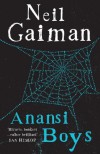William's Book Blog
Mostly book reviews. Very rarely I'll allow William Campbell Powell (author) to write a blog entry on publishing activity, but he's under orders to keep that stuff over on his Facebook page and on http://williamcampbellpowell.com
Currently reading
Ancillary Justice - hype or not?

I'm about a third of the way through the audiobook. Happy with the narrator (Adjoa Andoh) - clear, well modulated, range of accents - all of them plausible to my ear - so would definitely read another audiobook narrated by her.
The narrative alternates between two timelines, and after a really intriguing opening chapter in the present-ward timeline, seemed to languish a long time in the doldrums, especially in the past-ward line, world-building through the eyes of the narrator - the Ancillary of the title - who doesn't really understand humanity.
Nor, presented through her eyes, do I. It is clear that the lines between genders have blurred, while at the same time becoming even more important, at least in the eyes of one of the cultures described. I was expecting a big plot point, but it's dealt with as a throwaway.
So it's taken a long time to get to the "when it all changed" moment in the past-ward timeline, and that's been a test of patience over the first four hours of listening. The present-ward timeline had been more action-oriented. At the four hour mark, though, all the scene-setting was done, sympathies set up for the action, and the past-ward track revealed the potential for intrigue and double-crossing that had only been vaguely hinted at.
Good points: writing from a distributed point of view. Lots of "how are you going to pull this lot together" strands.
Bad points: failure to develop the two timelines at the same pace - enduring one and craving the other.
Still, we're past the "bad" bit now. I'm expecting good things from the rest, but nothing yet to indicate why this book is sweeping the boards, picking up so many awards. For me, it's on course for 3.5 to 4.5 stars.
 2
2
Hollow, hollow, hollow
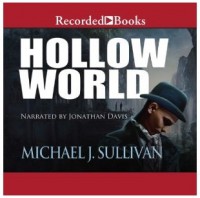
Michael J Sullivan is a new author to me - an Amazon recommendation when I was hunting for Kindle/Audible pairings. He's achieved trad published and self-published books - unusually this one was crowd funded, which allowed him to pay for professional external editing and audiobook production under his own control.
In many ways that has worked well - the narrator (Jonathan Davis) is good and the text he's reading is sound, editing-wise. Infodumps were few and far between. So the mechanics are good.
What about the story, then? It took me on an interesting journey, with a sympathetic, but far-from-perfect protagonist, Ellis Rogers. Ellis grows along the way, experiences loss and healing, learns to outgrow his prejudices and in most ways becomes a better human being. He also saves the world.
The book is reminiscent of Heinlein's The Door into Summer, which I intend as a compliment. Except that there isn't a cat, and Ellis is, if anything, a dog person. Oh well...
Hollow World is themed around time travel, which is Sullivan's primary "what-if". Unlike The Door into Summer, it's one way. That moves it into the Rip Van Winkle territory, so perhaps the what-if is "here's humanity, two thousand years in the future. It's different."
Ellis Rogers builds a time machine in his garage, is diagnosed with an incurable disease, and pushes the button. Arriving not quite when he expected, he stumbles straight into a murder, then meets Pax, whom we realise pretty quickly is going to be a major character.
Pax is an arbitrator, so by my reckoning ought to be able to persuade people. However, his main technique seems to be to say "X is true. I can't tell you how I know. Trust me."
This happens often enough that it becomes obvious that Sullivan is hiding a key plot element from the reader. For me, that breaks the rules of mystery writing - you don't point to the locked box and say "the solution lies within, but I the author am just going to tantalise you until it suits me to reveal what I have concealed therein." For the sake of balance, I will admit that he does provide clues as to what might be in the box (and I guessed right). But a good mystery novel works by hiding the truth in plain sight, then surrounding it with misdirection. Sleight of hand, not stonewalling.
I said I guessed right about the contents of the metaphorical box containing the key plot element. I'm afraid that it was a disappointment, in that it added yet another what-if, which breaks the rules of sci-fi - you make one major change to reality only.
Pax says "I can't tell you how I know - trust me" once too often, loses the trust of Ellis Rogers, and vanishes. Thereafter Ellis is on his own, taken in by the plausible lies of those about him, while I the reader am seriously considering a DNF on this, despite the excellent world-building and a lovable-but-annoying AI. The villains are too obvious, and Ellis' stubborn refusal to believe ill of his friend became seriously irritating. Again, there's lots of hand-waving by the author, and you know he's hiding stuff.
Finally the nature of the plot is revealed and it turns out that Hollow World has a single point of failure - really? They have Maker technology that can transmute elements and turn out pre-charged batteries of near-limitless power - and yet the villains decide to employ a twentieth-century device as their weapon - really? And that business of teleporting (yet another what-if) the weapons out into interstellar space? Umm, you're in the core of the planet, surrounded by molten rock - just dropping the things into the molten rock is quite sufficient to render the most powerful of weapons quite ineffective - if you don't believe me, ask Frodo.
Finally, I have to believe that Sullivan's tongue was firmly in cheek when he engineered a thrilling race against time, and maker-equipped Ellis with a digital watch so we could have a countdown in the movie version.
There is good in the book - the world-building - and bad - the physics - and ugly - the breaking of literary conventions. So I did finish the book, and it did take me with Ellis on a journey to a pat ending.
But the stuff I had to put up with along the way...
 1
1
The listener will nae take it, top o' the mornin', begorrah

I need to be clear that I'm reviewing the audiobook here - in print or ebook this title would fare at least one star better.
L J Ganser, the narrator, has done this book no favours whatsoever. I can just about put up with his pronunciation of Murchison, which he chooses to rhyme with murk rather than church. I can cope with the odd word rhythms, the lurches that telegraph that he's unfamiliar with the text, and the awkward elisions between vocal characterisations as he realises he's started in the voice of the wrong character.
But his Scottish accent is appalling. There are some key characters who are supposed to be Scottish, but they end up sliding into (southern) Irish as often as not. The stress and the rhythms are all wrong, and mostly it's the word "hae", which he pronounces "hay" with emphasis, rather than unstressed. I'm not sure he knows what it means or if he even realises it's a verb. It doesn't get any better, either. It's a sore that never heals from one end of the book to the other. Maybe a US listener wouldn't notice, but to a British ear it sounds false, stilted and amateurish from beginning to end.
OK, rant over.
As I'm finding more and more, having reactivated my Audible subscription, an audiobook is a significantly different sensory experience to reading. It's an interpretation, for one thing, like a cover version of a treasured song, which can throw up some real surprises. My most common reaction is either "I will never listen to anything by this reader ever again" or (less often) "I will seek out other audiobooks read by this reader, simply for the pleasure of listening to a master at work" - or its variant "I would like this reader to narrate my novel" ;-). Peter Kenny falls into the latter category - sadly L J Ganser has joined John Lee in the former category.
The other aspect of an audiobook is the pace. I can (and usually do) read the printed word at least twice as fast as a good narrator would read the same book. The slower pace of an audiobook exposes the tiny details of language, but also gives the listener more time to concentrate on details of plot and characterisation. This may or may not be a good thing.
In this case it is not a good thing. L J Ganser has shone a very bright light on a book I used to love without reservation, and I have seen some ugly flaws.
First among these is the character of Sally. In print, I saw Sally as a welcome female presence in an otherwise male-dominated book. When I listen, she becomes a cipher, with only two purposes - to provide a sympathetic voice to insist on the Moties' peacefulness (balancing the unsympathetic Horvath's equally pro-Motie viewpoint) and to provide a "strong female character" and love interest for Rod Blaine. Perhaps the book is a child of its time, but Sally shows a future that has regressed to the 1950s in its attitude to women. She is there to create polarisation of opinion, to hamper the Moties-are-dangerous faction, building tension until the book's final revelations. In order to give Sally the clout to do this, the authors have made her an anthropologist, and it's frightening to hear how little scholarly detachment she has from her subject of study.
To a lesser extent, similar criticisms can be levelled at all of the characters in the book - Renner, Potter, Kutuzov, Staley - they exist to exercise specific functions, to provide nudges, threats, irreverence or whatever. They are created to fulfil specific plot purposes and their characterisations don't stray one iota beyond what is necessary to achieve that.
Which leaves the Moties.
They remain some of the best aliens ever crafted by science fiction. They manage to be both sympathetic and alien - their motivations are cleverly dictated by their biology - and they have their superiorities and weaknesses. They have good intentions towards the humans, but they know themselves too well and know how they'll act in a crunch. In some tragedies the characters hurtle towards their doom ignorant of the forces that drive them. The Moties are Macbeth plus Myers-Briggs.
High tragedy.
Was game, now thrown
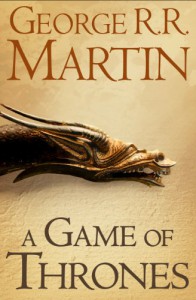
I had high hopes for this - lots of enthusiasm on book sites. I read a few chapters, got inside the heads of a few characters. Fine. Then I watched the first episode - it all tallied.
No more gore than normal for the genre. The sex likewise.
But I've lost interest.
I think the problem is that even in this first book the book is too consciously plotted. I can see the hand of the author everywhere; whenever he gets the chance to turn the screws, he does. I've stopped investing any effort in learning about the minor characters - they're pure cannon fodder.
There are no real surprises anymore. It's just fantasy soap-opera, with well-scheduled climaxes. I've read enough like this not to need to read another one. And certainly no desire to read another six, which I gather is the author's current plan.
It's not bad, by any means. It's well-written. The main characters are well drawn. But I happen to think that a novel should be a journey, not a maze of twisty little passages, all alike,
The niggle in the reader's ear...

I'm still surviving the narrator, but finding fresh irritation in the characterisations of the humans. Mostly it's Sally - in the intervening years since I last read "Mote" I guess I've come to expect more complexity from the female lead.
Remembering forward to the tension between Rod and Sally at the end of the book, I can see why the authors have given Sally such a one-dimensional perception of the Moties, but it's really quite painful to hear an anthropologist with so little detachment from the subject of study.
Niven and Pournelle know exactly where they're heading, and their actors have been crafted perfectly to get them there. I can't imagine Sally or Rod, or Renner or any of the others every doing something that surprised their creators. Unfortunately that makes them less human.
Still, it's the Moties' story really, and the homo sapiens cast has to take the roles they've been assigned.
 1
1
Chariots of the Gods?
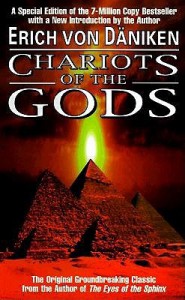 I have to admit, I own a copy of this, signed by the author, moreover.
I have to admit, I own a copy of this, signed by the author, moreover.It is pure bunkum, but it will deceive the credulous. If you see it, cross the street to avoid it. Buy a lottery ticket if you want to put your faith in something ridiculously unlikely.
A word in your ear

This is an old favourite, read many times in paperback, and my second foray into Amazon's coupling of eBook and audiobook.
Arrrgh!
The narrator is driving me to distraction. L J Ganser is not quite as infuriating as John Lee on Alastair Reynold's Revelation Space, but he comes close.
There's his pronunciation of Murchison, rhyming with murk, rather than church. Maybe that's just American English versus British English. Then there are the odd word breaks, as if he's never seen the text before, or has had to pause to turn the page. Then there's the range of his accents (small), and the too-often feeling that he realises half way through a sentence that he's started with the wrong voice for the character.
But the thing that sets my teeth on edge is his Scottish accent. It's excruciating. It's exaggerated into parody. And far too many times it turns into Southern Irish.
I am going to finish this book, because it is a favourite, and because I can rise above awful narration. But L J Ganser joins my blacklist of never-again narrators.
 4
4
Zombie Elementary
Howard is a great personal friend of mine, so anything I say about his book should be taken with a pinch of salt. That doesn't stop me re-blogging independent reviews just ahead of its release on 9th September.
Good luck, Howard.
Happy outcome to incitement of 'questioning authority' case.
I blogged on this a while back - http://williamcampbellpowell.booklikes.com/post/907013/little-brother-dropped-by-florida-school-for-incitement-of-questioning-authority - happy to report that common sense has prevailed.
Book haul at #LonCon3
Something from Ellen Klages, because I so enjoyed Wakulla Springs...
A Steampunk anthology, written by authors around Bristol, because I've read next to nothing in that genre.
Paradox - an anthology of stories on the Fermi paradox (why aren't there aliens?) by a collection of UK authors and scientists, from NewCon Press, a UK indie press.
The NewCon Press guy (Ian Whates) asked me which author(s) I liked. I mentioned Ray Bradbury and Clifford Simak. He suggested I try Strange Visitors, a collection of short stories by Eric Brown. From the tiny sample I read at the stand, it looks good.
The Rhymer is a novel written in rhyming prose, by a Glaswegian author. I visited the stand 3 times, intrigued. Each time I tried to get into the book, to get my head around its cadences, its rhythms. Twice I failed, because other people were yakking loudly, and I couldn't latch on. The third time, it was quieter, and suddenly it clicked and I could hear the rhythms in my head. It'll need quiet to read, and maybe I'll actually read some of it out aloud, when no-one can hear me, because it's crafted to be spoken aloud.
I also found two collections of short stories by William Tenn, that rare and wonderful author (only one of the books is here on booklikes, the other is "the human angle"). In the moment I wasn't entirely sure they weren't already in my collection, but at £4 each, it wasn't worth taking the chance. You don't come upon his books often enough to let one slip through your fingers.
 2
2
A newbie's day at #Loncon3
A short day, it must be said. Getting to the Excel Centre in East London is "easy", unless easy means "quick".
Anyway, I managed to fit in a panel on writing YA, to get a handle on how they run them. No surprises, so I'm confident about my own panel on Sunday.
I got to a reading, by Madeline Ashby, from her forthcoming book, Company Town. Not YA, but that's no problem. My main interest was - once again - to see how it's done. Conclusion: the bar isn't insurmountable.
I found the British Science Fiction Association stand, and as it offers peer critiquing from other writers, decided it was worth a punt.
And thence to the SFWA reception. There were a lot of "old friends" who recognised each other instantly and settled into cosy groups, plus as many "lost sheep" - writers from the oddest corners of Europe mostly - who braved the social barriers and managed to survive a whole evening of striking up conversations with total strangers. I count myself in the latter group.
A learning experience...
 2
2
Don't listen to the last chapter while driving...
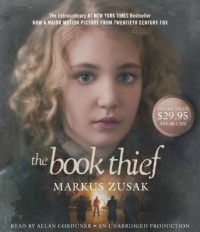
Big mistake. I teared-up during the last chapter - happy tears and sad tears. Narrow, twisty country lanes, but not much traffic coming the other way, fortunately, so I arrived at work in one piece.
I've read the book before (and seen the film, which wasn't bad at all, though necessarily lacked the intensity of the book), so there weren't really any plot surprises when I chose the Audible audiobook for my daily commute.
Except that Allan Corduner's reading brought the book alive all over again for me. His accent is very good with only a very few mispronunciations of the German sprinkled though the text.
When I hear an audiobook rendered this well, I catch all the little nuances of the text that I often miss when reading. The pace and the individual rendering of the narration was such that every character was filled out beautifully - even the minor characters I grew to love, and the loss of each and every one left a hole.
If you didn't get this book on paper, or wondered what all the fuss was about with the movie, then maybe you should try this audiobook.
Just ... park up somewhere safe when you reach the last chapter. Tissues might be useful, too.
Following in the footprints of giants
So what happened after Bill Masen escaped the clutches of the despotic Torrence and fled to the Isle of Wight? I always wondered...
Having recently revisited the Day of the Triffids on audiobook and reviewed it here, I stumbled across this sequel by Simon Clark and ordered it up from Amazon.
Hmm.
The Night of the Triffids ends up being an entirely serviceable SF adventure, but it doesn't break any new ground. The whole thing is far too pat - the villains are black-hearted, the heroes are unequivocally good, and rather naive. The triffids lack the scariness of the original, save in the opening pages. They are too easily defeated and the new variants, though novel, are ultimately no more threatening than the originals.
I got the feeling that the novel was written specifically for the American market, and with 21st century political correctness built in, as the Native Americans replay their Thanksgiving generosity of spirit, while Clark plays out the consequences of the circa 1950s apocalypse locking white American New York into a pre-NAACP white supremacist stereotype.
Somewhere in the mix there's a trace of Wyndham's conflict of moral ideologies, but they're an afterthought - given Wyndham's exploration of polygamous alternatives, it's disappointing that the protagonists' relationships are all monogamous and heterosexual.
No - this is simply an adventure story. It's "nice" that Clark has taken the trouble to tell us one vision of how the triffid universe might have unfolded. I'm not sure Wyndham would have approved.
What's 7 feet tall, green, deadly and hides in bushes?
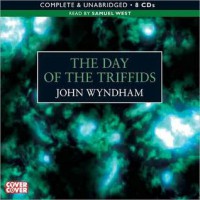
Well, a triffid, of course. When I encountered them first, aged eleven or so, they had a scariness value of at least a Dalek. The Day of the Triffids is a book I read many times, so that now, listening to the audiobook (well-narrated on the whole by Samuel West), I mostly recollected the text just ahead of the narrator reading it.
(The one complaint re West's narration is the voice of Josella, which came across older and whinier than I liked. Otherwise well paced, well modulated, clear and an all-round delight to listen to.)
For a book originally published in 1951 it's aged reasonably well. I did observe how the unfolding of the apocalypse was so dependent on the precise level of technology. A few years later, and the same catastrophe would have unfolded very differently as different aspects of society became more (or less) centralised. So much - in 1951 - seemed to fail the moment the human hand let go the tiller. Phones, electricity failed instantly. I'm not convinced.
Likewise, the speed with which the human race is whittled down (and tidily removed from the stage by a plague and the triffids) seems more of a plot device to reduce the visible conflict to man versus triffid, than it is a plausible exposition of how a civilisation might fall.
Its strength, I feel, is more in homing in on the moral choices that the characters make and on the nature of each morality, right only in relation to the society of the time. These, more than man-vs-triffid, are the interesting conflicts - the triffids are there simply to carry out sentence on those who fail to update their moral outlook to a new reality.
Once those conflicting moralities have competed one against another, Wyndham is done. He sketches a quick message of hope for the survivors who have adapted, and wraps up the tale in rather hurried fashion.
As a footnote, I was intrigued to discover, as I sat down to write this review, that Simon Clark penned a sequel - The Night of the Triffids - in 2001. Amazon has obliged...
 2
2
World Book Night Suspends Operations
"Spreading the love of reading, person to person"
2012-2014
Rest In Peace
A good summary of the Amazon Hachette dispute
NY Times calls it "Amazon’s secret campaign to discourage customers from buying books by Hachette"


